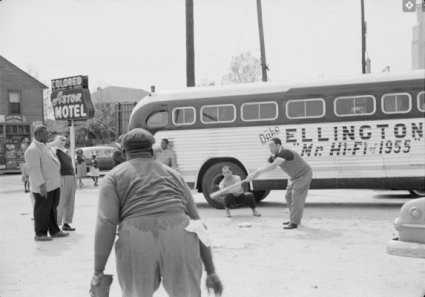.
.
photo by Charlotte Brooks for Look Magazine and Brooks Archive/Library of Congress

Duke Ellington and band members playing baseball in front of their segregated motel (“Astor Motel”) while touring in Florida; 1955
.
___
.
Swing in the Batter’s Box
In a pregame ceremony before the start
Of the Negro League World Series,
Cool Papa Bell and special guest, Duke Ellington,
A baseball fan from boyhood while in D.C.,
And visiting during a break from a jazz tour,
Take soft hacks at softballs
In front of the black press,
Judging to see who is the most cool in the batter’s box.
,
by Matthew Johnson
.
___
.
Fast, the Fastest
“They say that I was born too soon.
I say the doors opened too late”
– Cool Papa Bell
.
I liken you to Cool Papa Bell
Stealing my heart like he stole
330 bases. Switch-hitting Papa;
Mississippi-born Bell, born
Ten years too early to play
The major leagues.
Negro League center fielder
Left-handed, stealing two bases
On one pitch. Tremendous!
Flip the switch and he’ll be
Snug in bed before the
Room gets dark.
Fast, the fastest —
The baseball impresario!
Rattling the pitchers in
Cuba, California
and Mexico; fastest man
to ever play the game.
Ready to “smell the rose of Life”—
New worlds opening up because
Of baseball. To me, you look like
Cool Papa Bell, just blazing around
My heart like the black jazz
Of diamonds:
So fast
Too fast
The fastest!
.
by Connie Johnson
.
___
.
Like Baseball Like Jazz
…………..No one throw
a spitter anymore,
…………….don’t file spikes
…….to an axe edge
…………….cork bats instead
..fork balls, shoot junk
…………………..like Miles
………..like Monk.
.
by John Briscoe
,
___
.
On Hearing the Old Hometown Ballpark is Now a Mall
The weed-spotted field where sun lifted baseballs
………….high into blue spring and summer skies,
the rickety, splintering stands
………….where boys and girls flirted in the shade
of the sagging wooden roof while sucking on popsicles,
………….and gangly girls sprouting new womanhood
roamed the bleachers, strides tracked
………….by young male eyes and indulgent glances
from grownups reminiscing, and where smell
………….of sweat and leather filled dugouts,
all these have vanished under the weight
………….of wrecking ball and bulldozer.
The mating dance remains, but now exists
………….in a world of concrete, piped-in music,
clothing, record, book, and fast food stores.
………….Baseball has moved to the rows
of televisions filling the Sony store window.
………….The only fans are fat old men
trying to remember what it felt like
………….to hit a baseball dead center,
the thwack vibrating through to shoulders,
………….the swift rise of ball into a blinding blending
with sun and cloud, a suspense-filled
………….possibility high above mingled odors
of honeysuckle and new mown grass,
………….the surge of muscle toward first base, startled roar
of the crowd, bodies in movement everywhere,
………….and warmth filling sinew, flesh, bone,
nerve, and mind, as faces blur past
………….and lungs gasp and release precious air.
The sets’ sound systems are turned off,
………….but watchers supply their own soundtracks
where they are again fifteen, the wind blows
………….to left field, and Sandra or Suzie or Judy
or Bernadette watches and plots a meeting.
………….Teenage boys passing the row of sets
shake their heads and hope they never
………….get as old and fat as the men watching,
then turn their attention to the row
………….of gabbing, wildly gesticulating girls entering
the doughnut shop, laugh a little louder,
………….strut a little bolder, and enter the warm lair
redolent of baked goods, air freshener, and perfume,
………….smells to footnote a new generation.
They nod in passing to their classmate
………….behind the counter and make their approach.
The air conditioner hums like a crowd
………….waiting for the next pitch.
……………………..(First published by Bellowing Ark, 1997.)
.
by Michael L. Newell
.
.
Listen to the 1949 recording of Buddy Johnson playing his composition, “Did You See Jackie Robinson Hit That Ball?” [The Orchard]
,
,
Click here to read our interview with Neil Lanctot, author of Negro League Baseball: The Rise and Ruin of a Back Institution
.
.
___
.
.

John Briscoe is a San Francisco poet, author and lawyer. He has published four books of poetry, and five of prose. He’s received the Oscar Lewis Award in Western History, first Prize in the Top Shelf Book awards, and other literary distinctions. His law practice for more than fifty years has included representing countries in disputes with other countries in international courts, and advising the United Nations in the aftermath of the Gulf War. He serves on the boards of several literary organizations, and is a distinguished fellow at the University of California, Berkeley.
.
.
___
.
.

Connie Johnson is a Los Angeles, CA-based Pushcart Prize nominee whose poetry has appeared in Jerry Jazz Musician, San Pedro River Review, Cholla Needles, Rye Whiskey Review, Glint Literary Journal, Iconoclast, Sport Literate, Exit 13, and Writing in a Woman’s Voice. Everything is Distant Now (Blue Horse Press), her debut poetry collection, is available on Amazon.
Click here to read the Jerry Jazz Musician-published In a Place of Dreams: Connie Johnson’s album of jazz poetry, music, and life stories
.
.
___
.
.
photo by Destinee’ Allen

Matthew Johnson is the author of, Shadow Folks and Soul Songs (Kelsay Books) and Far from New York State (NYQ Press). He has a forthcoming chapbook scheduled for a late 2024 release through Finishing Line Press. His poetry has appeared in Delta Poetry Review, Hudson Valley Writers Guild, London Magazine, Northern New England Review, and elsewhere. A recipient of Pushcart Prize and Best of the Net nominations, he is the managing editor of The Portrait of New England and the poetry editor of The Twin Bill.
Click here to visit his website
.
.
___
.
.
Michael L. Newell’s most recent book of jazz poetry is Don’t Fret. He lives on the east coast of Florida.
.
.
___
.
.
Click here to read previous editions of The Sunday Poem
Click here to read “A Collection of Jazz Poetry – Spring/Summer, 2024 Edition”
Click here to read “Ballad,” Lúcia Leão’s winning story in the 65th Jerry Jazz Musician Short Fiction Contest
Click here for information about how to submit your poetry or short fiction
Click here to subscribe to the (free) Jerry Jazz Musician quarterly newsletter
Click here to help support the ongoing publication of Jerry Jazz Musician, and to keep it commercial-free (thank you!)
.
___
.
.
Jerry Jazz Musician…human produced (and AI-free) since 1999
.
.
.

































